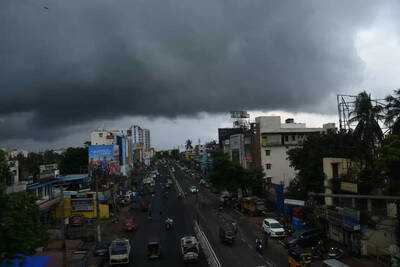When music connects, the language doesn't matter: Sid Sriram
Sometimes a song finds its way into places the artiste least expects. For Sid Sriram, that moment came when Virat Kohli recently revealed he had the singer’s Tamil track Nee Singam Dhan on loop. “For someone like Virat, who is at the peak of his game, to have my song on loop was incredible. I knew Nee Singam Dhan was special when I recorded it, but when it gets adopted in such unexpected ways, it becomes something bigger. It shows how music breaks language barriers. It’s about emotion; if a song connects, it connects, whether or not the listener understands the words. That’s the beauty of it.” In a chat with us, the musician and playback singer, who was recently in Bengaluru, talks about the thrill of performing live and how he sees music evolving in the age of AI, and more…
‘Every concert still feels like the first one’
Sid is set to take the stage with his multi-city India tour soon. Ask him what makes a concert special, and he says, “Of course, having great visuals and lights is essential, but at the core, it’s about the energy we build together in that room. Every concert feels like the first one. There’s never pressure, but there’s a sense of responsibility. We want fans to walk out feeling transformed, like they’ve been part of something magical.”
‘It’s an exciting time to be an artiste today’
He notes that one of the biggest shifts in the past decade has been the decentralisation of Indian music. “When I started, film music was the main avenue, and that’s what people listened to. Independent music existed, but was smaller. Now, it’s different. You have independent artists putting out singles, building huge fan bases, touring, and it’s exciting. The pool of voices has widened, and so have the perspectives,” he explains.
On a personal level, he reflects on how his own repertoire has grown: “For a long time, a lot of my playback songs were about heartbreak or yearning love. But then there are tracks like Nee Singam Dhan, which is about glory, and a few Tamil songs that are upbeat. So even within my discography, I’ve been able to explore different moods.”
Ask him about the turning points in his career, and Sid goes back to 2018. “Inkem Inkem Kaavaale was my first big Telugu hit, and it was a game-changer for me; it opened up a whole new industry. Samajavaragamana became a piece of music everyone connected with on a global level, and being associated with Allu Arjun garu has always been special. I don’t think anyone expected Srivalli to become as big as it did. Suddenly, people everywhere were singing it; it was a cultural moment,” he says.
‘If auto-tune, AI is used to avoid doing the work, then it’s a disservice’
While Sid admits to using auto-tune creatively as a stylistic choice, he draws the line at using it to hide flaws. “If you’re not willing to put in the work to get your pitch right and you rely on auto-tune, I dislike that. And I don’t like when artistes trick audiences by releasing ‘unplugged’ versions that are corrected in post-production. The stage is the ultimate equaliser, you can’t fake it there.”
When it comes to AI, Sid sees both promise and pitfalls. “Some of the AI stuff is fascinating. Hearing an SPB cover generated through AI is surreal. And I’ve heard friends use AI to spark ideas or even create temporary vocals before recording the real ones. But music needs the human spirit. Without it, it won’t do what it’s supposed to do. If AI is used creatively, as a tool, great. But if it’s used just to avoid doing the work, then it’s a disservice. There’s so much I still want to explore personally, without turning to AI. But I don’t judge others who use it: the intention is everything. If it’s honest, then it’s a great tool.”
‘Social media has democratised music’
“It’s really cool when old songs resurface on Instagram or reels. It speaks to the fact that music is timeless. Younger audiences who maybe weren’t listening 10 years ago suddenly discover it. And when something goes viral organically, without strategy, that’s magical. Social media has democratised music; anyone with a laptop can make music, and anyone can share it. That’s powerful. But the flip side is that a lot of people are chasing fame, not expression. If you’re making music only to go viral, it might feel empty. I’ve been there, I badly wanted to be a celebrity when I started, and when it happened, I realised there’s so much more to it than just being famous,” he says.
‘Every concert still feels like the first one’
Sid is set to take the stage with his multi-city India tour soon. Ask him what makes a concert special, and he says, “Of course, having great visuals and lights is essential, but at the core, it’s about the energy we build together in that room. Every concert feels like the first one. There’s never pressure, but there’s a sense of responsibility. We want fans to walk out feeling transformed, like they’ve been part of something magical.”
‘It’s an exciting time to be an artiste today’
He notes that one of the biggest shifts in the past decade has been the decentralisation of Indian music. “When I started, film music was the main avenue, and that’s what people listened to. Independent music existed, but was smaller. Now, it’s different. You have independent artists putting out singles, building huge fan bases, touring, and it’s exciting. The pool of voices has widened, and so have the perspectives,” he explains.
On a personal level, he reflects on how his own repertoire has grown: “For a long time, a lot of my playback songs were about heartbreak or yearning love. But then there are tracks like Nee Singam Dhan, which is about glory, and a few Tamil songs that are upbeat. So even within my discography, I’ve been able to explore different moods.”
Ask him about the turning points in his career, and Sid goes back to 2018. “Inkem Inkem Kaavaale was my first big Telugu hit, and it was a game-changer for me; it opened up a whole new industry. Samajavaragamana became a piece of music everyone connected with on a global level, and being associated with Allu Arjun garu has always been special. I don’t think anyone expected Srivalli to become as big as it did. Suddenly, people everywhere were singing it; it was a cultural moment,” he says.
‘If auto-tune, AI is used to avoid doing the work, then it’s a disservice’
While Sid admits to using auto-tune creatively as a stylistic choice, he draws the line at using it to hide flaws. “If you’re not willing to put in the work to get your pitch right and you rely on auto-tune, I dislike that. And I don’t like when artistes trick audiences by releasing ‘unplugged’ versions that are corrected in post-production. The stage is the ultimate equaliser, you can’t fake it there.”
When it comes to AI, Sid sees both promise and pitfalls. “Some of the AI stuff is fascinating. Hearing an SPB cover generated through AI is surreal. And I’ve heard friends use AI to spark ideas or even create temporary vocals before recording the real ones. But music needs the human spirit. Without it, it won’t do what it’s supposed to do. If AI is used creatively, as a tool, great. But if it’s used just to avoid doing the work, then it’s a disservice. There’s so much I still want to explore personally, without turning to AI. But I don’t judge others who use it: the intention is everything. If it’s honest, then it’s a great tool.”
‘Social media has democratised music’
“It’s really cool when old songs resurface on Instagram or reels. It speaks to the fact that music is timeless. Younger audiences who maybe weren’t listening 10 years ago suddenly discover it. And when something goes viral organically, without strategy, that’s magical. Social media has democratised music; anyone with a laptop can make music, and anyone can share it. That’s powerful. But the flip side is that a lot of people are chasing fame, not expression. If you’re making music only to go viral, it might feel empty. I’ve been there, I badly wanted to be a celebrity when I started, and when it happened, I realised there’s so much more to it than just being famous,” he says.
Read more








